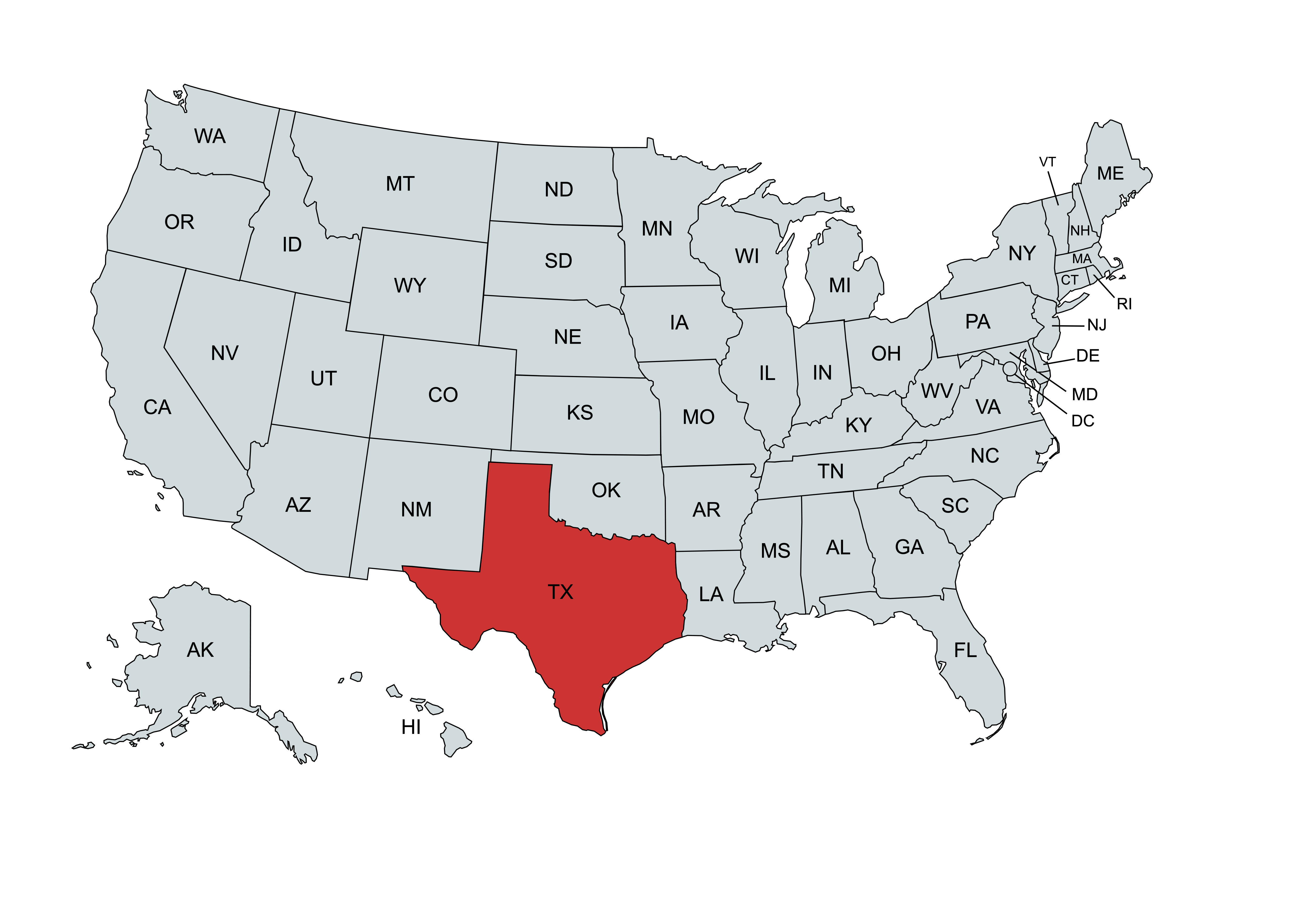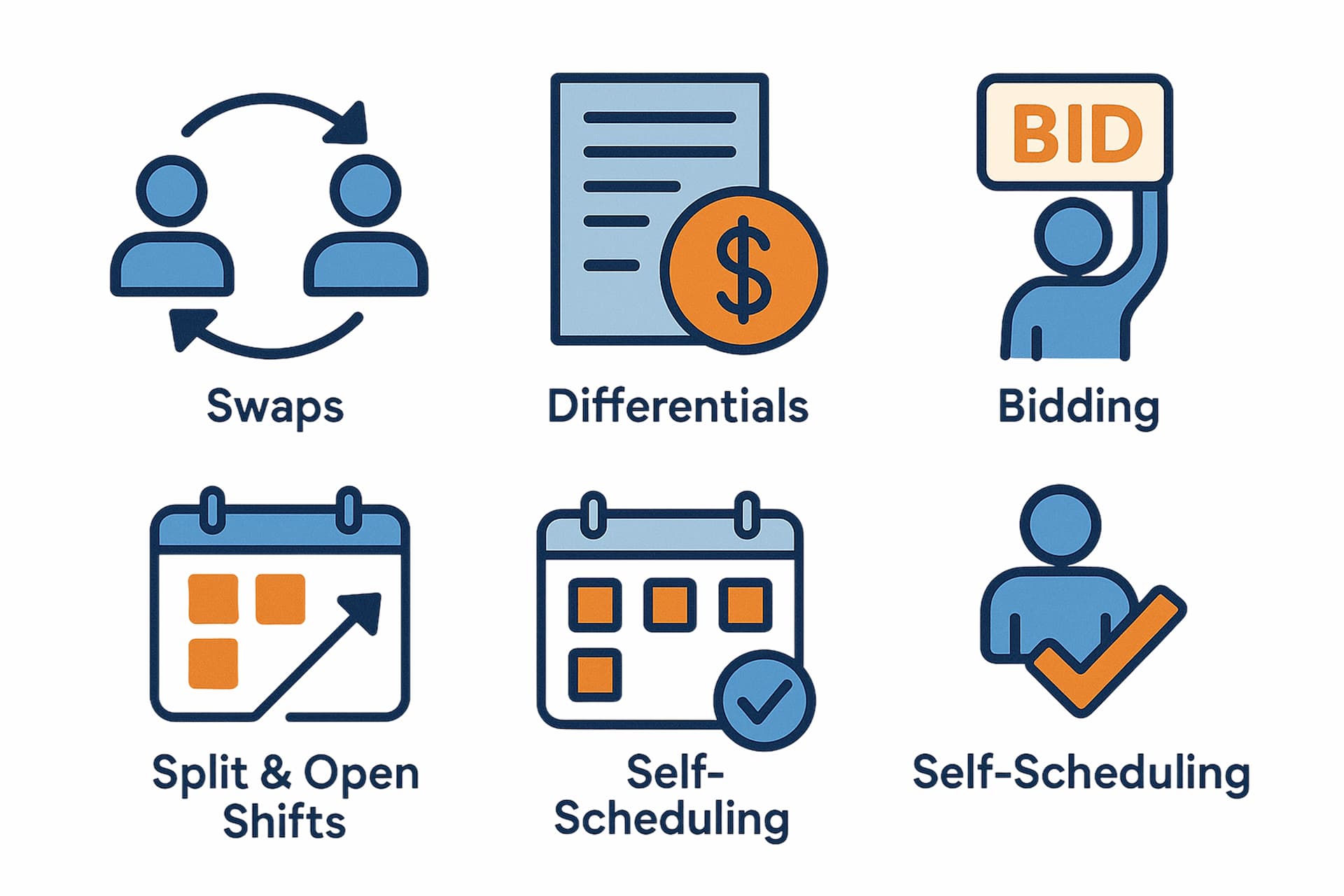Minimum Wage
Texas follows the federal minimum wage of $7.25 per hour. State law prohibits local governments from setting different minimum wages for private employers.
State minimum wage: $7.25 per hour for covered, non-exempt employees (tied to federal FLSA minimum).
Local preemption: Texas law prohibits cities and counties from imposing higher minimum wages for private-sector employers. Only the state or federal government can set minimum wage rates.
Youth minimum wage: Federal law allows employers to pay $4.25/hour to employees under 20 years old during their first 90 consecutive calendar days of employment.
Coverage requirements: Employers must be covered under FLSA, which applies to businesses with $500,000+ in annual gross volume or engaged in interstate commerce.
Highest rate applies: When federal and state laws differ, the law that provides greater benefit to employees applies.
Government contracts: Federal contractors must pay the prevailing wage rate as determined by the Department of Labor, which may be higher than minimum wage.
No training wage: Texas does not have a separate training wage beyond the federal youth wage provision.
Tipped Minimum Wage
Texas follows federal tipped wage rules allowing a cash wage of $2.13 per hour when combined with tips to reach the full minimum wage.
Tipped cash wage: $2.13 per hour direct cash wage for tipped employees who regularly receive more than $30 per month in tips.
Tip credit: Employers may take a tip credit of up to $5.12 per hour (difference between $7.25 and $2.13) to meet minimum wage requirements.
Make-whole requirement: If tips + cash wage do not reach $7.25/hour calculated on a workweek basis, employers must make up the difference.
Tip ownership: All tips belong to employees. Employers cannot retain any portion of tips, except for valid tip pooling arrangements.
Tip pooling: Permitted among customarily tipped employees (servers, bartenders, bussers). Managers and supervisors cannot participate in tip pools or keep any portion of tips.
Service charges: Mandatory service charges added to bills are not considered tips and must be treated as employer revenue unless distributed to employees as wages.
Notice requirement: Employers must inform tipped employees about the tip credit system and maintain accurate records of tips received.
Dual jobs: If a tipped employee performs non-tipped work for substantial time, the tip credit may not apply to those hours.
Overtime Laws
Texas has no separate state overtime statute; all covered employers must comply with federal Fair Labor Standards Act (FLSA) requirements.
Overtime rate: 1.5× the regular rate of pay for all hours worked over 40 in a workweek for non-exempt employees.
Workweek definition: A fixed, regularly recurring period of 168 hours (seven consecutive 24-hour periods). Can begin on any day and time as designated by employer.
Regular rate calculation: Includes hourly wages, salaries, commissions, non-discretionary bonuses, and shift differentials. Excludes discretionary bonuses, gifts, reimbursements, and certain other payments.
No daily overtime: Texas/federal law does not require daily overtime pay. Only weekly hours over 40 trigger overtime requirements.
No double-time requirement: No requirement for double-time pay on holidays, weekends, or any other circumstances unless specified by employer policy.
Exempt classifications: Executive, administrative, professional, computer employees, outside sales, and highly compensated employees may be exempt if they meet salary and duties tests.
Salary threshold (2025): Generally $844 per week ($43,888 annually) for most exempt classifications. Some exemptions have different thresholds.
Recordkeeping: Employers must maintain accurate records of hours worked, wages paid, and overtime calculations for at least 3 years.
Meal and Rest Breaks
Texas does not mandate meal or rest breaks for adult employees. Federal guidelines apply when breaks are provided.
No state requirement: Texas law does not require employers to provide meal periods or rest breaks to employees age 18 or older.
Federal break guidelines: Short breaks of 5-20 minutes are generally considered compensable work time and must be paid.
Meal periods: Bona fide meal periods of 30 minutes or more where employees are completely relieved of duties may be unpaid.
"Completely relieved" standard: Employees must be free from all work duties and able to leave the work area. If required to remain on-call or perform any work, the time is paid.
Nursing mothers: Federal law requires reasonable break time and a private space (not a bathroom) for expressing breast milk for up to one year following childbirth.
Break policy enforcement: If employers provide breaks, they must apply policies consistently and cannot discriminate in break allowances.
Written policies: Employers should document break policies clearly in employee handbooks to avoid disputes and ensure consistent application.
Leave and Holidays
Texas does not require private employers to offer paid vacation, paid holidays, or paid sick leave. Federal FMLA may apply to eligible employers.
Vacation leave: Not required by state law. If offered, terms follow employer policy or employment contract. Texas allows "use-it-or-lose-it" policies if clearly stated and lawfully applied.
Paid sick leave: No statewide requirement for private employers. Some public employers and federal contractors may have different requirements.
Holiday pay: Not required by state law. Holiday work is treated as regular hours unless employer policy provides premium pay.
Family Medical Leave Act (FMLA): Employers with 50+ employees must provide up to 12 weeks unpaid, job-protected leave (26 weeks for military caregiver) to eligible employees annually.
FMLA eligibility: Employee must have worked 1,250+ hours in past 12 months and work at location with 50+ employees within 75 miles.
FMLA qualifying reasons: Birth/adoption, serious health condition, military family leave, or qualifying exigency for military families.
Jury duty: Employers cannot discharge employees for jury service but are not required to pay wages during service.
Voting leave: No state requirement for paid time off to vote. Employers should allow reasonable time if polls are not accessible outside work hours.
Military leave: Protected under federal USERRA. Employees must be reemployed after military service with accrued seniority and benefits.
Final vacation payout: Required only if employer policy specifically provides for payout upon termination. Otherwise, "use-it-or-lose-it" is permissible.
Child Labor Laws
Texas child labor rules generally align with federal protections. Employers must follow whichever standard provides greater protection for minors.
Under 14: Employment generally prohibited except for limited exceptions: casual yard work, newspaper delivery, work for parent's non-hazardous business, entertainment with proper permits, school-supervised work programs.
Ages 14-15 (Texas limits): Maximum 8 hours per day and 48 hours per week; cannot work before 5 AM or after 10 PM on school nights; no later than midnight on non-school nights.
Ages 14-15 (Federal limits - apply when stricter): Outside school hours only; maximum 3 hours on school days, 18 hours in school weeks; 8 hours on non-school days, 40 hours in non-school weeks; 7 AM-7 PM (9 PM June 1-Labor Day).
Ages 16-17: Fewer hour restrictions but cannot work in hazardous occupations designated by federal law until age 18.
Prohibited occupations (all minors under 18): Manufacturing, mining, logging, power-driven machinery operation, roofing, excavation, certain driving jobs, meat processing, and other hazardous work.
Work permits: Not required by Texas law, but employers must verify age with acceptable documentation before hiring minors.
Break requirements for minors: Texas does not mandate breaks specifically for minors, though federal guidelines recommend breaks for younger workers.
Employer verification: Must maintain proof of age (birth certificate, driver's license, or other acceptable document) for all employees under 18.
Penalties: Violations can result in fines up to $10,000 per minor per violation. More severe for hazardous work violations.
Reporting: Parents or employees can file child labor complaints with Texas Workforce Commission online or by phone.
Pay & Wage Rules
Texas Payday Law regulates how and when employees must be paid, wage deductions, and final paycheck requirements.
Pay frequency: Employers must pay employees at least twice per month (semi-monthly) for most positions. Exempt employees may be paid monthly.
Designated paydays: Employers must designate paydays and pay employees on or before the designated date. Paydays should be posted or included in written policies.
Final paycheck: Must be paid by the next regularly scheduled payday following separation, regardless of whether termination was voluntary or involuntary.
Vacation/PTO payout: Required only if employer policy specifically provides for payout. Texas allows forfeiture policies if clearly documented.
Payment methods: Wages must be delivered at workplace, by registered mail, or via direct deposit with employee consent.
Pay statements required: Employers must provide itemized earnings statements showing: employee name, pay rate, total pay, deductions and purposes, net pay, and pay period dates.
Electronic statements: Permitted only if employees have reasonable ability to print or save the records.
Allowed deductions: Federal/state taxes, court-ordered garnishments, employee-authorized deductions (insurance, retirement), wage advances, and legally required deductions.
Written authorization required: Deductions for cash shortages, breakage, uniforms, equipment, or other business expenses require specific written authorization and cannot reduce wages below minimum wage.
Wage garnishment limits: Lesser of 25% of disposable earnings or amount exceeding 30× federal minimum wage per week ($217.50 in 2025).
Recordkeeping: Must maintain payroll records for at least 3 years including employee information, hours worked, wages paid, and all deductions.
Filing wage claims: Employees can file claims with Texas Workforce Commission within 180 days of when wages were due.
Hiring and Firing
Texas is an at-will employment state with important protections against discrimination and retaliation under state and federal law.
At-will employment: Either party may terminate employment at any time for any lawful reason or no reason, unless modified by contract, collective bargaining agreement, or specific statute.
Federal anti-discrimination: Title VII, ADA, ADEA, and other federal laws prohibit discrimination based on race, color, religion, sex (including pregnancy, sexual orientation, gender identity), national origin, age (40+), disability, and genetic information.
Texas Commission on Human Rights Act (TCHRA): State law prohibits same bases as federal law, applies to employers with 15+ employees (age discrimination applies at 20+ employees).
Retaliation prohibited: Cannot take adverse action against employees for reporting discrimination, filing workers' comp claims, serving on jury duty, reporting safety violations, or engaging in other protected activities.
Background checks: Must comply with Fair Credit Reporting Act (FCRA). Requires written authorization, pre-adverse action notice, and adverse action notice if taking action based on report.
Criminal history: No state "ban the box" law for private employers. Some federal contractors and specific industries have restrictions.
Credit reports: No state restrictions on employment credit checks, but FCRA compliance required.
Drug testing: Permitted for applicants and employees. Should have clear written policy and apply consistently. Some limitations for certain substances.
Wrongful termination: Termination illegal if based on protected characteristics, in retaliation for protected activity, in violation of public policy, or breach of implied contract.
WARN Act: Federal law requires 60 days notice for mass layoffs (50+ employees) or plant closures affecting 50+ employees at single site.
Documentation: Maintain consistent policies, document performance issues, preserve evidence of business decisions, and apply rules uniformly.
Workers' Compensation
Texas is unique as the only state where most private employers are not required to carry workers' compensation insurance.
Optional coverage: Texas is the only state where private employers can choose whether to carry workers' compensation insurance. About 60% of Texas employers maintain coverage.
Government contract exception: Private employers contracting with government entities must provide workers' compensation coverage for employees working on those projects.
Subscribers vs. non-subscribers: "Subscribers" carry workers' comp insurance and receive immunity from most employee lawsuits. "Non-subscribers" don't carry coverage and can be sued for workplace injuries.
Benefits of coverage: Medical care, income benefits (temporary and permanent disability), death benefits, and burial expenses for work-related injuries.
Income benefits types: Temporary income benefits (TIBs), impairment income benefits (IIBs), supplemental income benefits (SIBs), lifetime income benefits (LIBs), and death benefits.
Benefit amounts: Generally 70% of average weekly wage for income benefits. Maximum weekly benefit changes annually (approximately $1,231 in 2025).
Coverage options: Purchase from licensed insurance companies, self-insure (if meet financial requirements), or join certified self-insurance group.
Non-subscriber requirements: Must file annual Form DWC-005 with Division of Workers' Compensation, post Notice 6 (in English, Spanish, and other appropriate languages), and provide written notice to new hires.
Employee reporting: Employees have 30 days to notify employer of work injury and one year to file formal claim.
Employer reporting: Subscribers must report injuries causing more than one day lost time to insurance carrier within 8 days. Non-subscribers report same to DWC.
Dispute resolution: Administered by Division of Workers' Compensation. Includes benefit review conferences, contested case hearings, and appeals to district court.
Average costs: Texas employers pay approximately $0.55 per $100 of covered wages (varies significantly by industry and safety record).
Workers' Compensation for Employers – Texas Department of Insurance
Unemployment Insurance
Texas unemployment insurance provides temporary income replacement to eligible workers administered by Texas Workforce Commission (TWC).
Administering agency: Texas Workforce Commission (TWC) manages the state unemployment compensation program in partnership with U.S. Department of Labor.
Employer requirements: Register with TWC, file quarterly wage reports, pay unemployment taxes, respond to claims within 14 days, maintain records for 4+ years.
Tax rates (2025): New employers pay 2.7% on first $9,000 per employee. Experienced employers pay 0.23% to 6.23% based on benefit charge history.
Employee eligibility: Must have worked at least two quarters during base period, earned minimum wages, be unemployed through no fault of own, able and available for work, actively seeking employment.
Base period: First four of the last five completed calendar quarters before filing claim. Alternate base period available if don't qualify.
Benefit amounts: Approximately 50% of wages during highest paid quarter of base period. Minimum $73/week, maximum $600/week (2025).
Benefit duration: Up to 26 weeks of benefits. May be extended during periods of high unemployment through federal programs.
Disqualifications: Fired for misconduct, quit without good cause connected to work, refused suitable work, involved in labor dispute.
Work search requirements: Must make minimum three work search contacts per week and register for work. Document all job search activities.
Filing claims: File online at unemployment.texas.gov or by phone. Must file weekly claims to continue receiving benefits.
Employer protests: Employers have 14 days from claim notice to protest and provide separation information. Failure to respond may result in benefit charges.
Appeals process: Can appeal determinations to Appeal Tribunal within 14 days, then to Commission, and finally to state court if necessary.
Workplace Rights & Safety
Texas protects employees through anti-discrimination laws, workplace safety standards, and whistleblower protections.
Texas Commission on Human Rights Act (TCHRA): Prohibits employment discrimination based on race, color, disability, religion, sex, national origin, age (40+), or genetic information.
Employer coverage: Applies to employers with 15+ employees (20+ for age discrimination). Smaller employers may still be covered under federal law.
Sexual harassment: Considered sex discrimination. Includes quid pro quo and hostile work environment. Employers liable for supervisor harassment.
Filing discrimination complaints: File with TWC Civil Rights Division within 180 days of discrimination (300 days for sexual harassment/sex discrimination).
Federal complaints: Can also file with Equal Employment Opportunity Commission (EEOC) within 300 days. Dual filing common.
Workplace safety: Private employers covered by federal OSHA. Must provide safe workplace, maintain injury/illness logs (if 11+ employees), report serious incidents.
Whistleblower protection: Texas Whistleblower Act protects public employees. Private employees protected under various federal laws for reporting specific violations.
Retaliation prohibited: Cannot retaliate against employees for filing discrimination charges, workers' comp claims, safety complaints, or participating in investigations.
Right to organize: National Labor Relations Act protects private employees' rights to organize, join unions, and engage in collective bargaining.
Reasonable accommodations: Employers must provide reasonable accommodations for disabilities and religious practices unless it causes undue hardship.
Equal pay: Federal Equal Pay Act and Title VII require equal pay for equal work regardless of sex. Pay differentials must be based on legitimate factors.
Pregnancy discrimination: Pregnant employees entitled to same treatment as other employees with similar ability/inability to work.
Disclaimer:
The information provided is for general informational purposes only and does not constitute legal advice. Texas labor laws are complex and subject to change. Always verify current requirements with official Texas and federal sources. Everhour Shifts helps automate schedule compliance but does not replace professional legal or HR consultation.
Official Resources
- Texas Workforce Commission (TWC) – Official Site
- TWC Wage and Hour Program
- TWC Employment Law Information
- Texas Department of Insurance – Workers' Compensation Division
- U.S. Department of Labor – FLSA (Minimum Wage & Overtime)
- U.S. Department of Labor – FMLA
- U.S. DOL – YouthRules! (Child Labor)
- Equal Employment Opportunity Commission (EEOC)
- Occupational Safety and Health Administration (OSHA)



